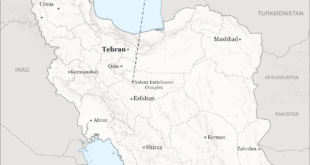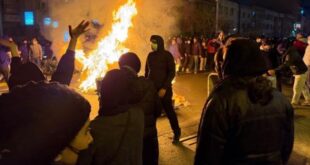Unless and until a ceasefire comes into effect, the Gaza war’s destabilising impact is set to spread further across the Middle East – to say nothing about the horrifying situation inside the besieged enclave.
At this point, more than seven weeks after Hamas launched its unprecedented incursion into southern Israel, it is increasingly important for the various parties directly and indirectly involved in the war to begin considering key questions about the “day after” and focus on Gaza’s future.
What political order will emerge in Gaza after the dust settles is unclear. What is clear, however, is that the White House is out of touch with the realities on the ground. The Biden administration has articulated its view that the Palestinian Authority (PA) is the “representative of [Palestinian] voices so it’s important that it play a leading role”.
Team Biden hints at the possibility of the PA led by President Mahmoud Abbas replacing Hamas in Gaza once this war is over. Yet, this idea is extremely problematic. Only a small percentage of Palestinians in Gaza would see it as legitimate for the PA and Abbas to come into the enclave and take over from Hamas.
"Mahmoud Abbas is totally ineffectual as a Palestinian leader, and [he accepts] any directive he gets from Israel and the US. He fell out of favour with Palestinian opinion a long time ago, especially in Gaza" Abbas’ lack of support in Gaza
Amid Israel’s war on Gaza, the PA is best described as this conflict’s “overlooked casualty”. One of the unintended consequences of Israel’s response to the 7 October surprise attack has been a rise in Hamas’ popularity at the expense of Abbas’ Fatah party, which has been losing support for years leading up to the chaotic violence of last month.
This decline in Fatah’s popularity has resulted from Abbas earning himself a reputation among Palestinians as a corrupt servant of the Israeli occupation who is propped up by the US and Israel.
“Mahmoud Abbas is totally ineffectual as a Palestinian leader, and [he accepts] any directive he gets from Israel and the US. He fell out of favour with Palestinian opinion a long time ago, especially in Gaza,” said Dr Nabeel Khoury, the former deputy chief of mission at the US Embassy in Yemen, in an interview with The New Arab.
“In my opinion, there is very little chance he would be accepted, let alone chosen in a free and fair election, by the Palestinians of Gaza.”
Marco Carnelos, the former Italian ambassador to Iraq, told TNA that it would be an “uphill battle” for the PA to begin ruling Gaza after this war.
With many Palestinians perceiving the PA as a “proxy of the Shin Bet” in the occupied Palestinian territories, the level of close cooperation between the PA and Israel in the security sector has greatly damaged Abbas and the PA’s image among Palestinians, especially against the backdrop of increasingly violent and aggressive behaviour by settlers whom the Israeli security forces shield in the West Bank.
“What are the advantages that the PA got for its cooperation with Israel when the latter has not shown any sign of restrain or has not worked to curb the settlers’ provocative actions against the Palestinians?” asked Carnelos.
“Considering these embarrassing precedents, it is highly likely that the Palestinians in Gaza will see an eventual PA taking over in Gaza as a replica of what has been going on in the West Bank and East Jerusalem in [recent] years, and they might oppose it,” said the former Italian diplomat.
No Arab military presence in Gaza
There has been some chatter about an Arab/international force managing post-war governance in Gaza. But Arab governments across the region have made it clear that they don’t want to touch the besieged enclave with a ten-foot pole. From their perspective, this is a crisis that Israel and its Western backers must own, and it is not the responsibility of Arab states to manage it.
Moreover, any Arab military force put in charge of Gaza would be subject to grave dangers. Perceptions of Bahraini, Egyptian, Emirati, or Jordanian forces being Israel’s partners or allies against any Gaza-based resistance could put them in harm’s way.
Carnelos told TNA that he is highly sceptical about any Arab/international force taking on the responsibility of post-war governance in the besieged enclave.
"The dream of the current Israeli Government to accomplish a 'Nakba in Gaza' must be prevented. This will be the real litmus test to see if the 'international community' care about the Palestinian question" “Gaza was, and after the current conflict it will be even more, the hottest of the hot potatoes. The humanitarian necessities will be daunting, the people will be full of rage and resentment,” said Carnelos.
“Whoever will be there will be exposed to an extremely difficult and hostile environment, not to mention the risk of repeated Israeli strikes to ‘finish the job’ somewhere. No country will be keen to risk its forces caught in a possible crossfire between Israel and the remnants of Hamas.”
While speaking earlier this month at the IISS Manama Dialogue security summit in Bahrain, Jordan’s foreign minister Ayman Safadi stressed that “there will be no Arab troops going to Gaza” and that the Arab states “are not going to be seen as the enemy”.
Amman’s chief diplomat emphasised that Arab governments were in agreement that this idea must be rejected. Entertaining that idea would send Israel’s government the wrong message about Arab states’ being willing to “clean up your mess”.
An Israeli re-occupation of Gaza
Prime Minister Benjamin Netanyahu’s far-right government is vocal about Israel playing a direct role in the future of Gaza governance, presumably in a post-Hamas period that Tel Aviv believes it can initiate through more warfare against the enclave.
Although Biden’s administration has an official opinion that there should not be a return to a direct Israeli occupation of Gaza, Dr Khoury told TNA that the White House is simply offering an opinion and “there is no will whatsoever to apply any pressure to translate American opinions (public opinion as well) into actual policy”.
As the former US diplomat explained, “I do not anticipate any change in Israeli goals in the near future”.
Thus, if Israel remains determined to maintain its on-the-ground military presence in Gaza, this is likely what must be expected for Gaza’s future. However, this is a recipe for everlasting violence and armed resistance, which will result in continued casualties for Israel’s army.
“Israel is already occupying the land, but a tactical occupation is a far cry from victory or, rather, peace, which frankly I see as a long way off at the moment. Israeli overreaction has opened Pandora’s box. It will be a long time before the situation stabilises,” explained Dr Federica Saini Fasanotti, a Senior Associate Fellow at the Milan-based Institute for International Political Studies (ISPI), in an interview with TNA.
Ultimately, it is safe to say that the Israeli leadership has failed to devise a clear, coherent, and realistic strategy for the post-war situation in Gaza. To say the least, this will prove extremely problematic for Tel Aviv.
“The Palestinians cannot return to a destroyed territory. They don’t have the economic strength for such reconstruction. So, it’s a question of where they will be placed. But the point is another: the inhabitants of Gaza are not objects. The Israeli operation will come at a very high cost in terms of stability,” said Dr Fasanotti.
"US and Israeli ruminations about the future of Gaza reflect an old colonialist mentality - that they would decide the future of the Palestinian people - ignoring the fact that this is precisely the root of the problem: occupation and denial of the right of self-determination" Tragically, US and Israeli policymakers incorrectly assess Hamas as the cause of the conflict, not the conflict as the cause of Hamas. Without addressing the underlying issues that have caused Palestinians to resist Israel, there will be no peace in Gaza, nor in Israel any time soon.
“American and Israeli ruminations about the future of Gaza reflect an old colonialist mentality – that they would decide the future of the Palestinian people – ignoring the fact that this is precisely the root of the problem: occupation and denial of the right of self-determination to those living under occupation,” said Dr Khoury.
As Carnelos explained, the ethnic cleansing goals that Israel wants to achieve are dangerous. Western powers must use their leverage over Tel Aviv to thwart this outcome.
“The dream of the current Israeli Government to accomplish a ‘Nakba in Gaza’ must be prevented. This will be the real litmus test to see if the ‘international community’ (i.e. the US and EU) care about the Palestinian question and the two-state solution. If the ‘Nakba in Gaza’ will be accomplished the US/EU credibility will be zeroed,” Carnelos told TNA.
 Eurasia Press & News
Eurasia Press & News



